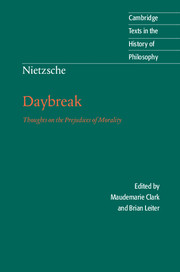Book IV
Published online by Cambridge University Press: 05 June 2012
Summary
208
Question of conscience. – ‘And in summa: what is it you really want changed?’ – We want to cease making causes into sinners and consequences into executioners.
209
The utility of the most rigorous theories. – One overlooks many moral weaknesses in a man, employing in this a coarse sieve, provided he is a constant adherent of the most rigorous theory of morality! On the other hand, the lives of free-spirited moralists have always been put under the microscope: the rationale of this procedure is that a blunder in life is the surest argument against an unwelcome insight.
210
The ‘in itself’. – Formerly we asked: what is the laughable? as though there were things external to us to which the laughable adhered as a quality, and we exhausted ourselves in suggestions (one theologian even opined that it was ‘the naivety of sin’.) Now we ask: what is laughter? How does laughter originate? We have thought the matter over and finally decided that there is nothing good, nothing beautiful, nothing sublime, nothing evil in itself, but that there are states of soul in which we impose such words upon things external to and within us. We have again taken back the predicates of things, or at least remembered that it was we who lent them to them: – let us take care that this insight does not deprive us of the capacity to lend, and that we have not become at the same time richer and greedier.
- Type
- Chapter
- Information
- Nietzsche: DaybreakThoughts on the Prejudices of Morality, pp. 131 - 178Publisher: Cambridge University PressPrint publication year: 1997

